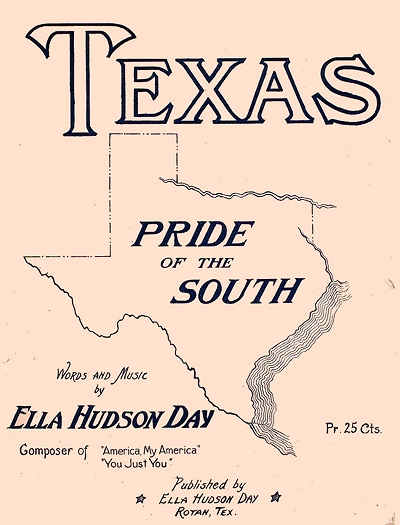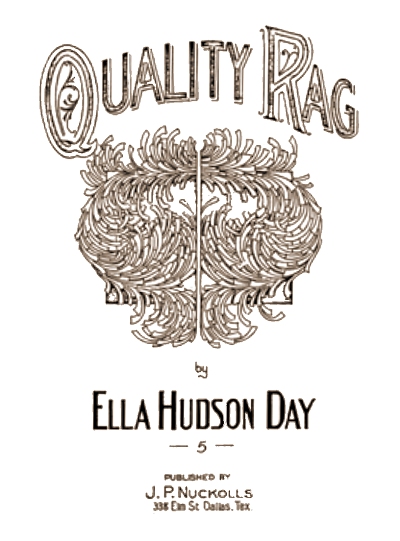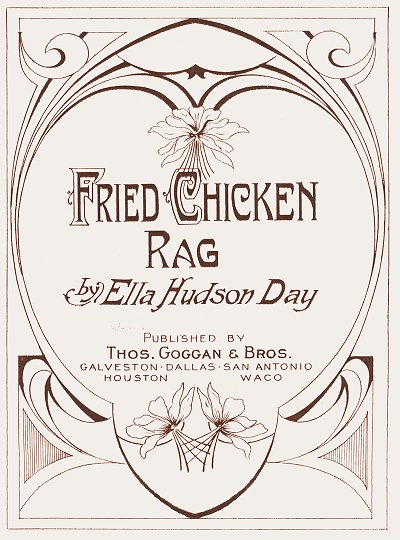 Luella Lucile (Ella) Hudson Day (November 11, 1875 to November 4, 1951) | |
 Compositions Compositions
| |
|
c.1900
America, My America1909
Texas, Pride of the SouthQuality Rag 1912
Fried Chickenc.1924
Cycle of Song1926
You, Just You |
c.1938
Dono Waltz1946
Tejas (Friendly State)1948
I'm in Love With YouUnknown/Uncertain
Sleep Time (?)Red Bird (?) |
Ella Hudson Day, born Luella Lucile Hudson in Texas, was a Texas-based composer who was originally raised in Whitney, Hill County (there are two Whitneys in Texas) in between Austin and Fort Worth. Her true birth date is partially unclear, as the 1900 enumeration puts her at February of 1876, which is at variance with the November 11, 1875 date cited more often, including on her death certificate. Ella's parentage was at one juncture also unclear. In the 1900 record she cited both parents as from Arkansas. In 1910 she claimed they were both Texans. In the 1920 census Ella put down South Carolina and Tennessee as birth states for her father and mother. Finally, in 1930, she changed it to North Carolina and Arkansas. It is evident that these were all just guesses, as the correct answer was Tennessee for both of them, going back to the 1820s.
In the 1920 census Ella put down South Carolina and Tennessee as birth states for her father and mother. Finally, in 1930, she changed it to North Carolina and Arkansas. It is evident that these were all just guesses, as the correct answer was Tennessee for both of them, going back to the 1820s.
 In the 1920 census Ella put down South Carolina and Tennessee as birth states for her father and mother. Finally, in 1930, she changed it to North Carolina and Arkansas. It is evident that these were all just guesses, as the correct answer was Tennessee for both of them, going back to the 1820s.
In the 1920 census Ella put down South Carolina and Tennessee as birth states for her father and mother. Finally, in 1930, she changed it to North Carolina and Arkansas. It is evident that these were all just guesses, as the correct answer was Tennessee for both of them, going back to the 1820s.An article in the Abilene Reporter News published in June of 1946 helped to confirm her lineage. Ella's father was William Haney Hudson, a blacksmith/farmer from Tennessee who moved to Arkansas with his second wife, Sarah Amanda Northcott. Luella was the youngest of their five children, including William R. (1844-1862), Martha Jane Ann (2/28/1847), Louisa (1852-1852), and Sterling Price (2/22/1871). Three other children, including William Looney, Maud and Susie are shown in some family trees, also born in Texas, but their connection has been discounted through official records. The Hudsons moved from Arkansas to Texas after the birth of Sterling. The family could not be readily located in the 1880 record. William and Sarah reportedly died in Whitney in 1885. While Ella's mother's name is not listed on her death certificate, the 1946 article gives this scenario high credibility.
the 1946 article gives this scenario high credibility.
 the 1946 article gives this scenario high credibility.
the 1946 article gives this scenario high credibility.At some point Ella had received fairly good musical training in school, and reportedly had already composed piano music as early as age ten. She studied music and voice in the Austin, Texas, school system, and eventually became an accomplished pianist and vocalist, playing some stringed instruments as well. Ella was teaching music by her early 20s in San Marcos, and then Comanche, Texas.
It was while she lived in that part of the state that she married Eugene Ramsey "Gene" Day (1870) on October 12, 1897. He was a tinner in the printing industry who had come from Hernando, Mississippi. Junius Eugene Day was born to the couple on January 29, 1899. The 1900 enumeration showed Eugene, Ella and Junius living in DeLeon, Texas, with Eugene employed as a tinner. Dono H. Day was born to the couple on September 25, 1900. The family moved to Rotan, Texas, in 1907, and were among the first to help establish that town. Eugene bought the first commercial plot there, becoming a highly regarded business owner. He ran a successful hardware store with his father and brother.
It is not fully clear if Ella went back into teaching in Rotan, except perhaps giving private lessons. However, she eventually did start to compose beyond standard piano pieces. Her first piano rag came out in 1909. Quality Rag was issued in Dallas by J.P. Nuckolls, but a second piece from that year, the song Texas, Pride of the South, was a vanity publication with her own imprint. Just the same, it had wide circulation and popularity, featured at the Waco Cotton Palace and used at many colleges and schools throughout the state.
The 1910 census showed the Day family residing in Rotan with Eugene as a hardware merchant. In 1912 Ella's most famous piece, Fried Chicken appeared in Galveston published by Thomas Goggan & Brothers. Then there was a gap of more than a decade before anything else appeared. Perhaps it was the challenge of raising teenage boys; perhaps the hassles of even getting published at that time; public records can't speak to the reasons. The 1920 enumeration showed Gene, Ella and Junius in Rotan with Gene as a hardware merchant and Ella listing no occupation. Dono was living next door with his new wife Eva and their infant son Donno Jr. (5/1919), employed by his father.
Then there was a gap of more than a decade before anything else appeared. Perhaps it was the challenge of raising teenage boys; perhaps the hassles of even getting published at that time; public records can't speak to the reasons. The 1920 enumeration showed Gene, Ella and Junius in Rotan with Gene as a hardware merchant and Ella listing no occupation. Dono was living next door with his new wife Eva and their infant son Donno Jr. (5/1919), employed by his father.
 Then there was a gap of more than a decade before anything else appeared. Perhaps it was the challenge of raising teenage boys; perhaps the hassles of even getting published at that time; public records can't speak to the reasons. The 1920 enumeration showed Gene, Ella and Junius in Rotan with Gene as a hardware merchant and Ella listing no occupation. Dono was living next door with his new wife Eva and their infant son Donno Jr. (5/1919), employed by his father.
Then there was a gap of more than a decade before anything else appeared. Perhaps it was the challenge of raising teenage boys; perhaps the hassles of even getting published at that time; public records can't speak to the reasons. The 1920 enumeration showed Gene, Ella and Junius in Rotan with Gene as a hardware merchant and Ella listing no occupation. Dono was living next door with his new wife Eva and their infant son Donno Jr. (5/1919), employed by his father.As of 1924 Ella was cited as being a member of the Rotan Baptist Church, the Daughters of Confederacy, Chairman of Child Welfare Department of the Rotan Parent-Teacher Organization, Corresponding Secretary of the 1921 Club, and logically the Chairman of Music in Fisher County for the Texas Federation of Women's Clubs. Ella was also an ally of the Rotan Chamber of Commerce, and represented Rotan at the initial meeting of the Texas Centennial Celebration in Austin on February 12th, 1924. To add to that already impressive list, Mrs. Day was a member of the Poetry Society of Texas, and a newspaper correspondent who was an active member of the Texas Woman's Press Association.
In 1926, she self-published a song titled You, Just You. There were reportedly several more songs in print that predated this one in the 1920s, but to date only a newspaper mention of a song cycle has surfaced. Sometime during this period, Eugene had moved back into the printing business, so one might imagine that he could potentially have been responsible for engraving and printing Ella's works. The 1930 census showed the couple in Rotan listing Eugene as working in his own print shop.
The Day's oldest son, Junius, died on May 23, 1938. As of the 1940 census taken in Rotan, Eugene appeared to have retired from his printing business which had been run nearly until that time. Eugene died on December 27, 1940. Ella had become active during the enormous Texas growth period which was outlined in the Edna Furber novel Giant, remaining a part of the Texas Federation of Women's Clubs, and serving in various offices in the organization. There were reports that in the 1940s she may have published a few children's songs, including titles like Sleep Time and Red Bird, although confirmation of this has only been word of mouth to date. They have not surfaced, so may have been local vanity short runs. She had one final song printed in 1948, I'm in Love With You, published in Hollywood, California.
Known in her later years as "Ma Day," Ella confessed her motivation for composing to the Abilene Reporter News in 1946: "I do not write music because I want to — I write it because I must get it out of my system and that seems the only practical way to do it."
Even after Eugene's death, she remained active and in the news around her part of Texas almost to the end of her life. Ella passed on in Rotan in 1951 of congestive heart failure at nearly 76 years.
Much of the timeline and background research presented here, including an invaluable "Who's Who" article from Texas in 1924 that also contained her rare portrait, was sent by Nora Hulse, the champion of women composers of the ragtime era and beyond. Many thanks to Texas music historian Larry Wolz who provided some tidbits of information used here. Also, fan Don Lewis who knew Ms. Day in his youth (back in the Day), and reported on the children's songs. The remaining demographics and information on compositions was uncovered by the author from public records and newspapers.